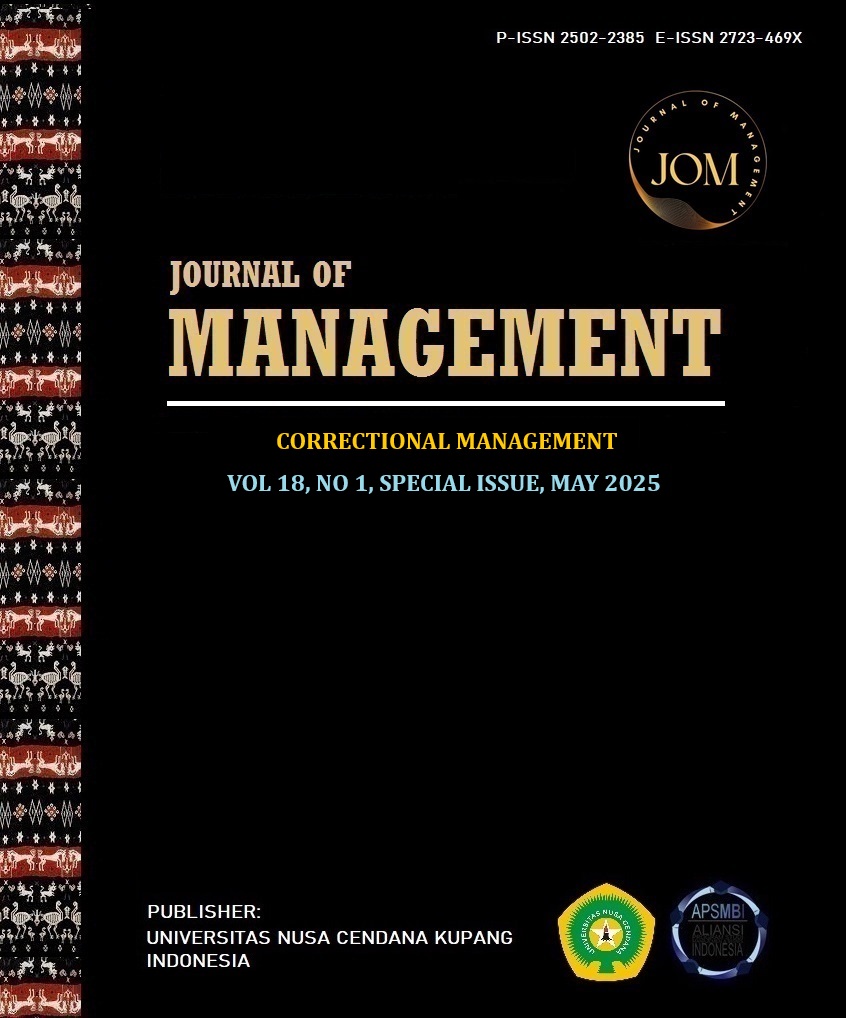ANALYSIS OF THE CAUSES OF INDISCIPLINED NARCOTICS INMATES IN CLASS IIB BLITAR CORRECTIONAL INSTITUTION
Abstract
This research aims to analyze the causes of indiscipline behavior among narcotics prisoners at Class IIB Blitar Penitentiary and propose solutions to reduce the incidence of such behavior. Narcotics crimes are categorized as extraordinary crimes that significantly impact the stability within penitentiaries. Data shows that the majority of inmates in Blitar Penitentiary are narcotics offenders, who often engage in various forms of disciplinary violations such as smuggling contraband. The causes of indiscipline behavior are influenced by internal factors, such as psychological stress due to the deprivation of freedom, and external factors, such as overcrowding and a lack of social control from both families and the prison environment.The research employed a qualitative approach using a case study method. Data was collected through interviews with prisoners, prison officers, and correctional counselors, as well as direct observations in the field. The findings indicate that indiscipline violations are driven by weak social bonds between prisoners and their families or society, as well as a lack of inmate participation in constructive rehabilitation programs. The study recommends more intensive social rehabilitation programs, enhanced supervision, and inmate empowerment initiatives to reduce the risk of disciplinary violations. Consequently, narcotics prisoner rehabilitation is expected to be more effective, minimizing the rate of infractions within the penitentiary.
Keywords: Narcotics Prisoners; Indiscipline Behavior; Social Control
Downloads
References
https://doi.org/10.24198/jppm.v2i3.37834
Andrian, A. (2022). Peran Kontrol Ssoial Pada Perilaku Delinkuensi Anak Kasus Tawuran (Vol. 01).
Ardiva, A., & Wirdanengsih, W. (2022). Kontrol Sosial Orang Tua Terhadap Perilaku Anak-Anak Pengguna Gadget ( Studi Kasus : Nagari Suliki Kecamatan Suliki Kabupaten 50 Kota ). 5, 257–266.
Barata, A. P. A., Ayu, H., & Faried, F. S. (2023). Penanganan Pelanggaran Ketertiban Dan Keamanan Di Lembaga Pemasyarakatan Kelas IIB Wonogiri. Jurnal Bevinding, 1(01), 75.
Berghuis, M., Sentse, M., Palmen, H., & Nieuwbeerta, P. (2022). Receiving Visits and the Relative Timing of Inmates’ Infractions: Investigations into how Inmates’ Behavior Change Before and After Visits in Dutch Prisons. Journal of Research in Crime and Delinquency, 0–31. https://doi.org/10.1177/00224278221118367
Burke, R. H. (2019). Social control theories. An Introduction to Criminological Theory, 318–343. https://doi.org/10.4324/9781315204871-19
Burns, R. ., & Eddy. (1993). Konsep diri : teori, pengukuran, perkembangan dan perilaku / R.B. Burns ; alih bahasa, Eddy.
Costello, B. J., & Laub, J. H. (2020). Social Control Theory: The Legacy of Travis Hirschi’s Causes of Delinquency. Annual Review of Criminology, 3, 21–41. https://doi.org/10.1146/annurev-criminol-011419-041527
Creswell, J. W. (2010). Research design pendekatan kualitatif, kuantitatif, dan mixed. Yogyakarta: Pustaka Pelajar.
Fikriani, I. (2015). Pelaksanaan Sanksi Administrasi bagi Warga Binaan Pemasyarakatan yang Melanggar Tata Tertib di dalam Lembaga Pemasyarakatan Klas I Malang. Jurnal Hukum, 4–20.
Hamzah, I. (2020). Psikologi Klinis dalam Konteks Pemasyarakatan. In Insan Cendekia Mandiri (Issue July).
Hirschi, T. (1969). Causes of Delinquency. Universitas of California Press.
Kusumastuti, H. & Hadjam, M. N. (2017). Dinamika Kontrol Sosial Keluarga dan Teman Sebaya pada Remaja Berisiko Penyalahgunaan NAPZA. Jurnal Psikologi UGM, 3(2), 70–85.
Mariska, D. D. (2013). Pengambilan Keputusan Narapidana Untuk Melakukan Tindakan Indisipliner Berulang.pdf.
Perdana, A., & Ismaniar, I. (2020). Hubungan Antara Kontrol Sosial Orangtua Dengan Kenakalan Remaja Di Komplek Mega Permai V Kelurahan Lubuk Buaya Kota Padang. SPEKTRUM: Jurnal Pendidikan Luar Sekolah (PLS), 8(3), 348. https://doi.org/10.24036/spektrumpls.v8i3.110037
Santoso, P. B. W. (2016). Pelaksanaan Hukuman Disiplin Terhadap Narapidana Yang Melanggar Tata Tertib Berdasarkan Peraturan Menteri Hukum Dan Hak Asasi Manusia No.6 Tahun 2013 Tentang Tata Tertib Lembaga Pemasyarakatan Dan Rumah Tahanan Negara Dalam Kaitannya Dengan Pembinaan Nara. Jurnal Nestor Magister Hukum, 3(6), 1–25.
Satyagraha, R. K. (2016). Peran kontrol sosial terhadap perilaku kenakalan siswa di sekolah. Skripsi.
Scott, D. (2014). Pains of imprisonment. A Companion to Criminal Justice, Mental Health & Risk. https://doi.org/10.1002/9781118845387.wbeoc020
Sumara, D. S., Humaedi, S., & Santoso, M. B. (2017). Kenakalan Remaja Dan Penanganannya. Prosiding Penelitian Dan Pengabdian Kepada Masyarakat, 4(2). https://doi.org/10.24198/jppm.v4i2.14393
Sunoto, S. P., Aziz, W. K., & Dhesthoni, D. (2023). Ketahanan Sosial dan Pengaruhnya Terhadap Penyalahgunaan Narkoba Pada Remaja: Perspektif Teori Kontrol Sosial Travis Hirschi.
Wiratama, R. A. (2021). Implementasi Manajemen Security Dalam Mencegah Pemasyarakatan. Widya Yuridika, 4, 295–306.

 Dila Sisfani(1*)
Dila Sisfani(1*)



